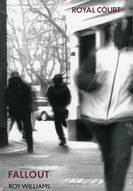Fallout
The theme of black on black violence amongst London's inner city black youth is the subject of two new plays in London. Kwame Kwei-Armah's "Elmina's Kitchen" currently playing at the National Theatre and Roy Williams' new play "Fallout" at the Royal Court. However, any comparison soon reveals Kwei-Armah's play to be an insightful observation of black disaffection and a far more disquieting script.
Roy Williams appears to have based his play around the murder of 10-year-old Damilola Taylor on a council estate in Peckham. Damilola was returning home from a computer class at the New Peckham Library, when he was stabbed by a gang of youths. A reward was offered and a 14-year-old girl came forward claiming she had witnessed the murder. A trial went ahead against 4 youths on the estate, but the trial collapsed after allegations of police leading the 14 year old witness and that the witness was more interested in the reward money then in telling the truth.
The play begins with a gang of four black youths, kicking Kwame to death. We later see the youths at the local burger bar, laughing and joking, with apparently no remorse for their actions. The gang of youths paint a grim picture of the violence and meaninglessness of their actions. These kids pull out knifes and guns when they think they have been 'dissed' (shown disrespect), and commit robberies as if it is their second nature to do so.
What we discover as the play develops are the insecurities that dominate these young people's lives, despite their violence and wishing to appear hard and indifferent, they are complex insecure characters.
Emile, the gang member most responsible for Kwame's death, is afraid that he will lose his girlfriend Shanice, who is seen as 'hot' by the other lads, if he appears too soft. Emile is not as cruel as he first appears and when Dwayne, the gang leader beats up a kid, Emile says to him 'Have a heart, blood'. Without peer pressure one senses he could grow up to be a decent person. Shanice, like Emile also struggles with keeping up her street cred, and is dragged down by the negative influence of her friend Veronica. Dwayne too has his own shame in the form of his alcoholic father, who roams the streets of the estate covered in urine, begging for money.
Williams uses the two police officers investigating the case to probe the vex issue of Political Correctness. Joe is a black officer who was brought up on the same estate that Kwame was murdered . Joe is impatient to get results, and apparently hates most of the kids on the estate whom he refers to as 'Niggers, low life black bastards'. He can identify with Kwami, the murdered black kid who wanted to make something of his life, and also with Emile, the luckless youth that Joe might so easily have become. Matt the white officer is, according to Joe, the voice of 'wishy-washy liberal crap'. He claims to see past the colour of the skin of the kids on the estate, and yet according to Joe he treats them differently. Matt stands accused by Joe of compromising the investigation by trying too hard to understand the kids.
The acting is excellent, especially from Lennie James as Joe, his anger and scorn for the mindset of the youths is palpable and he seethes with indignation. Michael Obiora gives a confident performance as Dwayne, the composed easy-going gang-leader, and Marcel McCalla captures perfectly the deeply insecure Emile, who swings between cockiness and self-doubt.
The Royal Court has been transformed for this production. The stall seats have been removed and the stage is raised on scaffolding to bring it to the same level as the dress circle with the audience seated in the round. The Stage Design by Ultz resembles a concrete tiled passageway in a council estate block. A set of steps lead onto the stage with two sets of chrome and glass doors on either side and wire meshing surrounding two sides of the stage. Whilst being in the round benefits the play by creating a more intimate space, one wonders if such alteration is necessary. Seats are unreserved, and some are behind the wire fencing - audience comfort seems to have been ignored in this needless attempt to create a stark and barren environment.
Ian Rickson's production is bruising in its bleakness, yet managers to keep the humanity of the characters alive. It is this contrast that keeps the play dynamic and interesting on those few occasions when the script becomes scant.
Alan Bird
Production photos by Gautier Deblonde
Notices from the popular press....
MICHAEL BILLINGTON for THE GUARDIAN says, "Thrillingly staged show....what is really impressive is Williams's capacity for telling the honest truth and for exposing the divisions within what we term 'the black community'. BENEDICT NIGHTINGALE for THE TIMES says, "Combines intelligence with impact." CHARLES SPENCER for DAILY TELEGRAPH says, "Brilliantly contentious drama....Ian Rickson gives this powerful and important drama the bruising, confrontational production it deserves.....thrillingly fine play." NICHOLAS DE JONGH for THE EVENING STANDARD says, "Fine production...thin socio-drama with angry passion."
External links to full reviews from newspapers
The Guardian
The Times
Daily Telegraph
Originally published on
